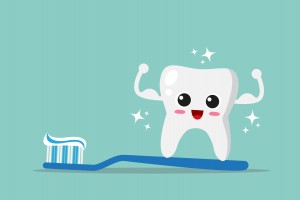 Think about what your teeth go through every day. Even if you eat a healthy diet, brush and floss every day and visit your dentist regularly, the average diet and our busy lifestyles are not always conducive to optimal dental hygiene. If teeth become demineralized, this can lead to tooth decay. However, there are ways in which you can remineralize your teeth to prevent bacteria from wreaking havoc inside your mouth.
Think about what your teeth go through every day. Even if you eat a healthy diet, brush and floss every day and visit your dentist regularly, the average diet and our busy lifestyles are not always conducive to optimal dental hygiene. If teeth become demineralized, this can lead to tooth decay. However, there are ways in which you can remineralize your teeth to prevent bacteria from wreaking havoc inside your mouth.
What is Teeth Demineralization?
Demineralization is something you don’t want to happen to your teeth. When you consume food that contains sugars or carbohydrates, and especially if you don’t brush afterwards, the bacteria inside your mouth will feed on this and create acid. When your mouth’s pH becomes especially acidic (below 5.5), this acid will dissolve the primary component of tooth enamel, carbonated hydroxyapatite. This is known as demineralization. If you don’t remineralize your teeth, the loss of enamel can make teeth more sensitive and cavities may form. There is a powerful connection between diet and enamel erosion, both in terms of what causes demineralization and what can be done to remedy it.
Saliva Saves the Day!
The best way to remineralize teeth is through your own saliva, which will maintain your mouth at a healthy, slightly alkaline pH level. The best level for optimal remineralization is 7.5 to 8.5 pH. Anything less than that, and you may begin to lose essential minerals from the teeth such as calcium and phosphorous. Various conditions can decrease saliva, such as certain medications or if you’re a mouth breather.
Using Commercial Fluoride Toothpaste to Remineralize Teeth
Fluoride, which is found in most commercially-available toothpastes, helps to strengthen tooth enamel in addition to combatting bacteria. Some toothpastes add ingredients like calcium, amorphous calcium phosphate (ACP) and/or milk protein casein phosphopeptide (CPP) to enhance the fluoride’s ability to remineralize tooth enamel.
Remineralize Your Teeth with a Healthy Diet
Studies have shown the best foods and supplements to remineralize teeth, as well as certain foods to avoid or limit. For example, Phytic acid, found in grains, legumes, nuts and seeds, and to a lesser extent in certain fruits and vegetables, can rob the body of calcium and cause a lower absorption of other minerals. However, adding enough calcium, phosphorous and vitamin D will counter this effect. Fat soluble vitamins A, C, D and K will also help prevent tooth decay. Limiting sweet and starchy foods, eating healthy fats such as coconut oil and cutting back on foods that are high in phytic acid will help improve your oral health.
Make Your Own Tooth Powder: Natural Ingredients to Remineralize Teeth
For those who wish to minimize their fluoride use, there are other ingredients that can be used as a powerful remineralizing tooth powder, an alternative to toothpaste. Do-it-yourself aficionados can make their own tooth powder at home. Some of the ingredients you might use are Bentonite clay, calcium powder, baking soda, cinnamon, cloves powder and mint. Bentonite clay is alkaline, loaded with minerals, and it binds to and draws out toxins such as heavy metals. Baking soda, in addition to having minerals and being alkaline, will remove stains from the teeth. Calcium powder whitens while adding essential calcium. Both cloves and cinnamon are naturally antibacterial, and mint soothes the gums while giving your mouth a fresh taste.







Leave a Reply